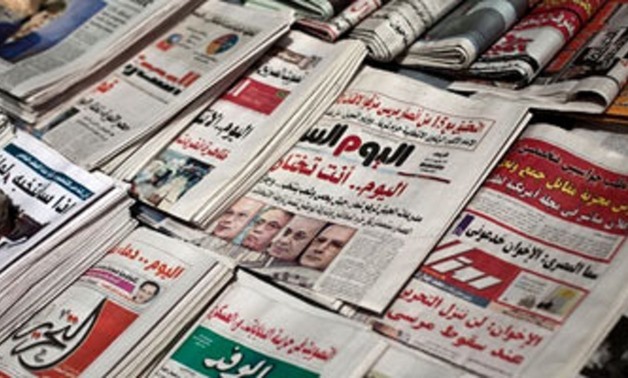
Daily Newspaper - File photo
CAIRO – 02 June 2017: Arab newspapers tackled Arab-Qatari conflict, the 50th anniversary of the Six Days War and other topics on Friday.
Youm7
In an article titled “Victims’ images…sometimes virtual feelings are harmful,”columnist Akram al-Qasas demonstrated disadvantages of republishing photos and videos of victims and martyrs killed due to incidents or terrorist acts. He said republication of such photos would harm feelings of the victims’ families and relatives.
Qasas said political or commercial aims may be behind the republication of the victims’ photos. Sectarian strife can be easily resulted in circulation of such photos because they would arouse the feeling of anger of the victims’ families. Moreover, photos of old incidents may be republished alleging they belong to new events in the way that they serve a political agenda.
Al-Ahram newspaper
Poet Farouk Gowaida wrote ‘Qatar between senior withdrawal and junior advantage.’ Gowaida proves that Qatar is just a puppet at hands of major powers. He believes the Arab fabric is targeted by a demonic scheme that aims to break the Arab world’s unity. He pointed out that Qatar had neither a significant role nor political ambitions. However, the West and the U.S. administration began promotion for that small state in the Gulf area, wishing it can be able to lead the region.
Establishment of the largest U.S. military base in Qatar and empowerment of Doha-based al-Jazeera satellite channel helped the Qatari Royal Family seek more ambitions to achieve. According to the writer, al-Jazeera channel contributed to the American invasion to Iraq and Afghanistan, civil wars in Syria,Libya and supporting terrorist groups globally.
Gowaida quoted late U.A.E. Sheikh Zayed saying, “One hotel in Cairo is enough to embrace all the population of Qatar.”
Al-Hayat
Lebanese columnist Jihad al-Khazen wrote “unlimited Israeli political villainy.” He recalled memories of the Arab-Israeli war in 1967. He said the Israeli Likud and the United States are the meanest on earth. They are enemies to the entire humanity. He sounded his opinion by recalling statements of Israeli Prime Minister Netanyahu who promised the Israelis to keep the Western Wall and Aqsa Mosque under the Israeli sovereignty.
Al-Khazen denied the Israeli claims that the occupied Palestine embraces Jewish antiques. In fact, the Western Wall belongs to the Islamic era not to the Jews.
In an opinion piece titled ‘Reflections in the 50-anniverary defeat of June,’ Waleed Mahmud Abdel Nasser recalled sad and painful memories of the 50th anniversary of the Arab defeat by Israel on June 5, 1967. The so-called 6-day war still harms each Arab citizen in the world.
The Arabs could not survive after that defeat. Arab land is still occupied by the Israelis. The writer said the defeat revealed how fragile were our Arab ‘so-called’ national regimes, and showed how magnitude the challenges that the Arabs have confronted due to regional and international hostility.
One of the main reasons for the defeat, Arab leaders and media figures did not accept recognizing the presence of Israel as a powerful and U.S.-backed state. They insisted on underestimating the power of that newborn country, as a result the Arabs did not care about improving their educational, structural, military or economic status.
According to the writer, the defeat uncovered the loopholes in our Arab military structures. That war proved that armies that rely on ideological beliefs do not survive, unlike armies that rely only on professional training and armament.
Saud al-Rayes wrote ‘Qatar…Two Sisters.’ Al-Rayes discussed the Qatari-Gulf states dispute. The writer tackled the Kuwaiti mediation between Qatar and the Gulf states. He said that Kuwaiti step proved that the Kuwaiti administration believed that the Qatari news agency website was hacked, and it agreed with the Gulf States that these statements had significant impacts on the region.
The writer said Saudi Arabia seeks to reunification of the Gulf fabric and adopts a no-collision strategy with the world’s major powers; including Russia. He wondered the motives of the Qatari administration behind these statements.
Al-Rayes acknowledged that the region is not ready to involve itself with Iran which has supported terrorism. The Arab media campaign against Qatar proved the Gulf security is a priority. He indicated that the dispute cannot be settled by the media, but via politics.
Comments
Leave a Comment